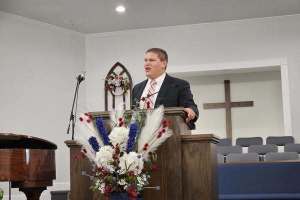Evidence of Higgs Boson 'God Particle' Disproves Religion or Supports Creation?
Dr. Larry Vardiman, writing for the Institute of Creation Research before the July 4 announcement, believes that although the Higgs Boson has no "specific religious connotations," its discovery may very well shed light on the biblical account of creation. Dr. Vardiman, a senior research scientist, Astro/Geophysics at the ICR, writes:
"It's legitimate to try and understand how mass, space, and time originated, but not if the processes we use to explain their origin don't involve the Creator. ... The Big Bang says that the universe began as an infinitesimal point and expanded outward, creating space and mass billions of years ago. Although this idea may seem consistent with the description of creation in Genesis 1:1, it is thought to have happened billions of years ago, while the Bible says it happened in one 24-hour day only a few thousand years ago. The theory is also presented as a natural event that didn't require God's involvement."
"Sadly, scientists who have the best seat in the house to observe God's handiwork through a microscope or a telescope often seem to be the first to deny that He is the Creator. Because they deny He is Creator, they fail to grasp the ultimate explanation for the world around us. Scripture says it best: 'For the invisible things of him from the creation of the world are clearly seen, being understood by the things that are made, even his eternal power and Godhead; so that they are without excuse' (Romans 1:20)."
Dr. Jeff Miller, writing last year for Apologetics Press, claimed the discovery of evidence for the Higgs Boson might not prove anything (emphasis his own):
"Notice that without the existence of this theoretical particle, Big Bang theorists recognize that the Universe could not even form after the Big Bang theoretically occurred. Its existence would not prove that the Universe did form in the manner suggested by Big Bang Theory. Its existence would not even prove that the Universe could form after a hypothesized Big Bang occurred. Further, its existence would not prove that the Big Bang itself could occur at all."
"Its existence would not prove that matter could exist forever or pop into existence out of nothing, one of which must be true in order for the Big Bang to even get started. And its existence would certainly not prove that the scientific laws governing the Universe could write themselves into existence. However, without the existence of the particle, theorists know the Big Bang could not happen. Thus, discovery of its existence would not prove anything in the end, but only allow evolutionists to cross one of the many chasms that stand in the way of their theory even being considered a remote possibility. In other words, the Big Bang has not even reached square one in the realm of proof. It still lies firmly in the realm of impossibility. Bottom line: the Creation model still stands as the most logical explanation for the origin of the Universe — the model that matches the scientific evidence."
What do you think — will evidence of the Higgs Boson particle give the Big Bang theory strength and weaken arguments for creation? Or is the recent potential discovery something that everyone, both Christians and non-theists, can celebrate?





























